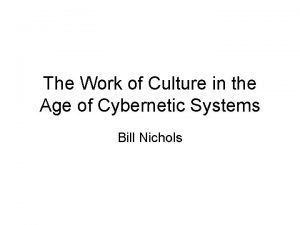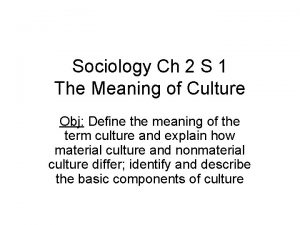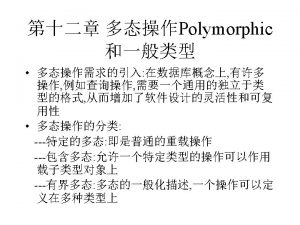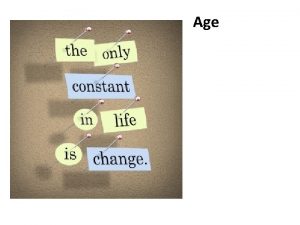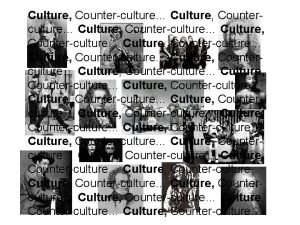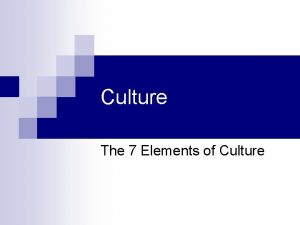The Work of Culture in the Age of












- Slides: 12

The Work of Culture in the Age of Cybernetic Systems Bill Nichols

Bill Nichols • American historian and theoretician of documentary film. • Professor of Cinema and Director of the Graduate Program in Cinema Studies at San Francisco State University • Newsreel: documentary filmmaking on the American left, New York: Arno Press, 1980 • Ideology and the image: social representation in the cinema and other media, Bloomington: Indiana University Press, c 1981. • Blurred boundaries: questions of meaning in contemporary culture, Bloomington: Indiana University Press, c 1994. • Representing Reality. Issues and Concepts in Documentary, Bloomington: Indiana University Press, 1991 • Introduction to documentary, Bloomington: Indiana University Press, 2001.

• Benjamin, Walter. ‘The Work of Art in the Age of Mechanical Reproduction’ 1936 • How cybernetic systems, symbolized by the computer, represent a set of transformations in our conception of and relation to self and reality of a magnitude commensurate with the transformations in the conception of and relation to self and reality wrought by mechanical reproduction and symbolized by the camera. (627)

• Contrast characteristics of cybernetic systems with those of mechanical reproductions • Establish a metaphor with which to understand these cybernetic systems • How this metaphor acquires the force of the real

Mechanical reproduction and Film Culture • • • The transformation strips art of its aura Art without aura is a substitute for mystique Transformation of perception Manifestation industrial capitalism montage

Cybernetic Systems and Electronic Culture • Simulation as an imaginary Other • Cybernetic interaction: Simulating processes of conversation

Cybernetic Systems and Electronic Culture Mechanical reproduction • Changes relation to original work • The copy reproduces the world Cybernetic systems • Changes relation to environment and mind • The chip simulates the world

Cybernetic Systems and Electronic Culture Mechanical reproduction • Fascination with a fetishized object of desire • Desire for the fixed but unattainable and the illusion of possession Cybernetic systems • Fetishistic addiction to a process of logical simulation • Desire for the dialogic or interactive and the illusion of control

Cybernetic Metaphor • Human as automated intelligent system and vice versa: simulation of real, reality as simulation • Baudrillard: staging powers of simulation establish a hyperreality • Cyborg as new identity • Judicial-political: human/computer and reality/simulation

Cybernetic Metaphor • Copyright: intellectual property • Patent: technological property • Original practical applications of nature vs force of nature • Software as algorithms • Copyright: does not protect ideas, processes, procedures, systems and methods

Pac Man vs KC Munchkin • 1981: central character as personality - fetishization of the image as object • 1982: as genre, differences are noticed by player - fetishization of the process as object

Transformative potential The task is not to overthrow the prevailing cybernetic model but to transgress its predefined interdictions and limits, using the dynamite of the apperceptive powers it has itself brought into being. (640)
 Iron age bronze age stone age timeline
Iron age bronze age stone age timeline Iron age bronze age stone age timeline
Iron age bronze age stone age timeline The work of culture in the age of cybernetic systems
The work of culture in the age of cybernetic systems Pop culture examples
Pop culture examples Individual culture traits combine to form culture patterns.
Individual culture traits combine to form culture patterns. Batch culture vs continuous culture
Batch culture vs continuous culture Batch culture vs continuous culture
Batch culture vs continuous culture Collectivistic cultures
Collectivistic cultures Difference between american and indian culture
Difference between american and indian culture Stab culture and stroke culture
Stab culture and stroke culture Folk culture and popular culture venn diagram
Folk culture and popular culture venn diagram Sub culture vs counter culture
Sub culture vs counter culture Folk culture and popular culture venn diagram
Folk culture and popular culture venn diagram


